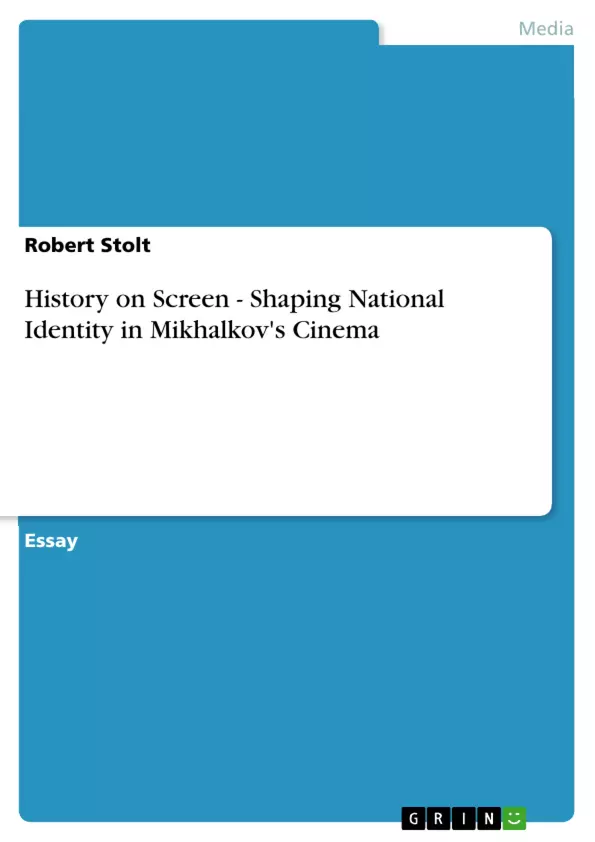With the dissolution of the Soviet state and the breakdown of Soviet ideologies the question about Russian national identity became a central issue in post-Soviet Russian culture (Horton 2001: 218). By promoting specific values of traditional Soviet ideals, Mikhalkov, in Burnt by the Sun [Mikhalkov, 1994], revives a national ideology and aims to re-establish the Russian national identity in post-Soviet Russia. The film recalls the idea of a distinctive Russian fate that has, admittedly, time and again resulted in political catastrophes, but nevertheless has become the basis of Russian culture having unique status and thus is crucial in forming a contemporary Russian cultural identity (Anemone 2001: 143). By reminding of past traditions and values, the film is devoted to explore what being Russian means (Larson 2003:492).
The major attention in this essay lies in exploring the utopian world created by Mikhalkov to establish an illusionistic past with the focus on the national hero. Modern nation-states often feel the need to create a myth of national identity. By doing so it is
crucial to have a heroic figure at hand that represents the strengths and potencies of the nation and that people can aspire to and look up to. Such an ideal, however, cannot exist
in real life which is why Mikhalkov creates an illusionistic world within reality to allow his heroic figure to flourish. By recalling a heroic Russian past, specifically a Soviet one, Mikhalkov demonstrates his affection to Socialist ideas and his endeavour to bring about a ‘new hero of our time’ (Larsen 2003: 493); just one as post-Soviet Russia with its national identity being unsettled and uncertain was lacking. Therefore, the second
chapter of this essay is dedicated to explore the effects of Mikhalkov’s film making that forms a polarity between utopia and reality, with a focus on the time and space structure. Moreover, in the third chapter, an emphasis is placed on the character of
Kotov who, as the great family father, embodies the heroic figure that the director has created to re-establish historical ideals. Finally, in a retrospective analysis, the essay will be concluded by drawing a parallel between the Russian cultural crisis and the
film’s shaping of Russian national identity.
Inhaltsverzeichnis (Table of Contents)
- Introduction
- Utopia Versus Reality
- The Soviet Hero
- Conclusion
Zielsetzung und Themenschwerpunkte (Objectives and Key Themes)
This essay explores the shaping of Russian national identity in Nikita Mikhalkov’s film, Burnt by the Sun, through the lens of the film’s utopian world and its depiction of the Soviet hero. The film is seen as a response to the cultural crisis facing post-Soviet Russia, where traditional values and ideologies no longer provide a foundation for national identity.
- The film’s portrayal of a utopian world that contrasts with the harsh reality of post-Soviet Russia.
- The creation of a national hero figure who embodies the strengths and values of the nation.
- The role of time and space in shaping the film’s narrative and its relationship to Russian cultural and historical reality.
- The significance of the Soviet past and the desire to re-establish traditional values and ideologies.
- The impact of the film on the understanding of Russian national identity in the post-Soviet era.
Zusammenfassung der Kapitel (Chapter Summaries)
The essay begins by exploring the film's depiction of utopia versus reality. It examines how the utopian world created by Mikhalkov contrasts with the harsh realities of post-Soviet Russia, particularly through the film's time and space structure. The second chapter focuses on the character of Colonel Kotov, who embodies the Soviet hero figure designed to re-establish historical ideals. Kotov's role as a family father and his embodiment of Soviet values are analyzed in detail. The conclusion of the essay draws a parallel between the Russian cultural crisis and the film's shaping of national identity.
Schlüsselwörter (Keywords)
Key terms and concepts explored in the essay include: Russian national identity, post-Soviet Russia, utopia, reality, Soviet hero, family father, cultural crisis, traditional values, and the film Burnt by the Sun.
Frequently Asked Questions
What is the central theme of Mikhalkov's film "Burnt by the Sun"?
The film explores Russian national identity by contrasting a utopian Soviet past with the harsh political realities of the Stalinist era.
How does Mikhalkov define the "Soviet Hero" in the film?
The hero, embodied by Colonel Kotov, is depicted as a charismatic family father and a representative of national strength that the post-Soviet audience can aspire to.
What is the significance of the utopian world in the movie?
Mikhalkov creates an illusionistic, sun-drenched past to allow his heroic figure to flourish, providing a sense of stability for a contemporary Russia facing a cultural crisis.
How does the film address the breakdown of Soviet ideologies?
It attempts to re-establish a national ideology by reviving past traditions and values that were lost after the dissolution of the Soviet state.
What is the "unique status" of Russian culture mentioned in the text?
It refers to the idea of a distinctive Russian fate that, despite political catastrophes, remains the crucial basis for forming a modern cultural identity.
- Quote paper
- Robert Stolt (Author), 2010, History on Screen - Shaping National Identity in Mikhalkov's Cinema, Munich, GRIN Verlag, https://www.grin.com/document/151745



